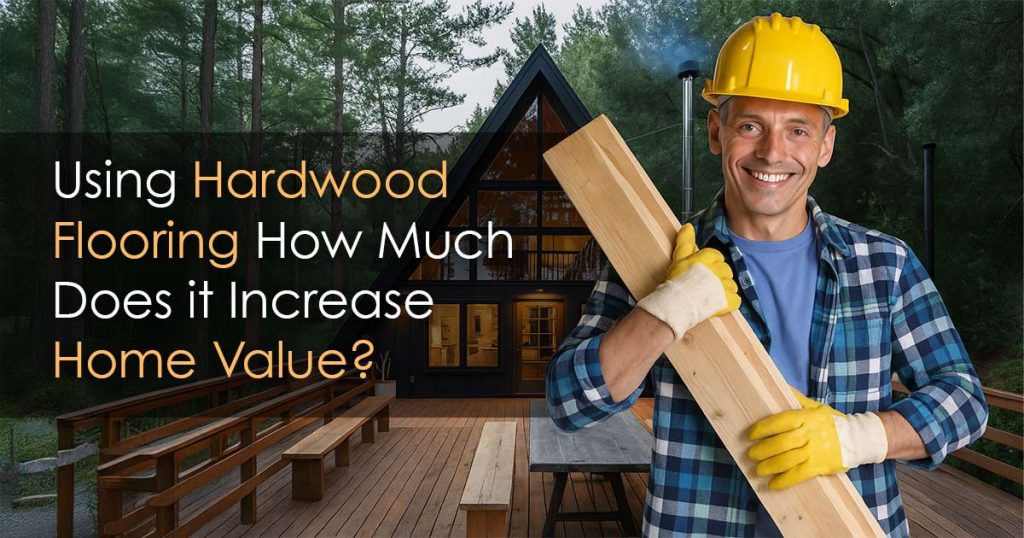When thinking about home improvements, flooring is often overlooked. However, it’s one of the most powerful ways to transform a home’s ambiance and increase its appeal. New flooring makes a home look fresh, clean, and well-maintained, especially when it’s hardwood.
So, do hardwood floors increase home value? The short answer is yes. But there’s more to the story. The type of wood, neighborhood standards, and current condition of the home all influence how much value you can expect.
Why Buyers Are Drawn to Hardwood Floors
Hardwood floors make a home feel warmer, cleaner, and more refined. They offer more durability and visual appeal than carpet, especially in living rooms and dining areas.
Carpet tends to trap dust, fade, and stain. Hardwood, on the other hand, highlights the natural charm of a space and holds up better over time.
Real estate agents agree. A Zillow report found that homes with natural elements like white oak hardwood floors sold for up to 3.7% more, adding nearly $12,000 in value on average.
How Much Do Hardwood Floors Add to Home Value?
Hardwood flooring can raise home value by as much as 2.5 percent. That’s around $6,500 more on average, depending on the home’s condition and location.
How much does new flooring increase home value depends on what you’re replacing. Swapping out old carpet or vinyl with hardwood can make the space feel newer and more move-in ready.
Which Types of Hardwood Add the Most Value?
Solid hardwood, like oak or walnut, is a top choice for increasing home value. It’s durable, can be refinished several times, and works well with many home styles.
Wide plank hardwood is another strong option. With fewer seams, it creates a clean and elegant look. Buyers often associate wide planks with quality and custom design.
Bamboo and reclaimed wood are also appealing. Bamboo is a sustainable choice that resists wear, while reclaimed wood adds rustic character. These types can be more expensive but attract buyers who want unique features.
Engineered hardwood suits homes in areas with shifting humidity. It may not boost value as much as solid wood, but it still upgrades a space compared to carpet or laminate.
Comparing Hardwood to Other Flooring Options
Luxury vinyl plank (LVP) looks like wood but costs less. It’s waterproof and durable, which makes it ideal for basements, kitchens, or homes with pets and kids.
Still, real hardwood adds more value to home resale than vinyl. In markets where wood is the standard, buyers often expect the real thing. Some agents say vinyl may reduce interest in higher-priced listings.
Laminate and luxury vinyl tile (LVT) are other alternatives. These materials are affordable and easier to install but don’t carry the same long-term appeal. Buyers might see them as temporary solutions rather than lasting investments.
Should You Refinish or Replace?
If your home already has hardwood floors, refinishing them might offer more value than replacing them. This process restores the look of the floor by sanding and applying a new finish.
Refinishing costs between $3 and $8 per square foot. It can offer a return on investment of up to 147 percent, based on reports from the National Association of Realtors.
This option is ideal if the floors are in good condition but look worn or outdated. You can also change the finish to match current design trends, helping your home feel more updated without the higher cost of new flooring.
What Else Affects the Value Hardwood Adds?
Even if you invest in top-quality hardwood, your overall return still depends on the rest of your home. Buyers look at the full picture. If your kitchen or bathroom feels outdated, the floors alone won’t seal the deal. Flooring upgrades work best when paired with other improvements like fresh lighting, modern fixtures, and neutral paint.
Also, your neighborhood plays a big role. Installing premium hardwood in a modest area where most homes use basic vinyl may not deliver the return you expect. It’s important to match upgrades to what buyers in your market want. In some areas, vinyl may actually be the smarter choice.
Before making a decision, talk to a real estate agent who knows your local market. They can help you figure out how much your upgrade could realistically return and whether it’s worth the cost.
When Every Step Counts
Hardwood flooring updates more than just the look of a room. It shows attention to detail, lasting quality, and thoughtful care. Buyers notice this right away. That early impression can influence whether they see your home as move-in ready or a project.
If you plan to improve your home’s feel and future value, start with the floor. Few upgrades influence comfort, appearance, and resale appeal as effectively as hardwood. It adds beauty, function, and the kind of lasting value that helps both homeowners and buyers feel confident in their next step.
